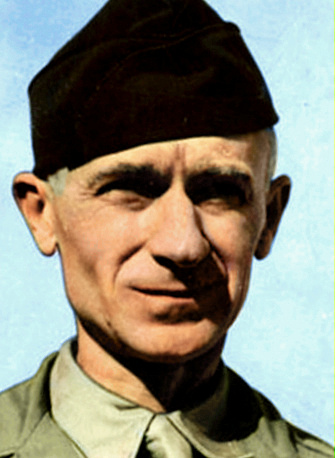Royalty opposed –
Operators cite benefits now paid miners
Welfare taxes total about 10 cents a ton
…
Welfare taxes total about 10 cents a ton
…
Gas masks, tin hats can be bought cheap
By Douglas Smith, Scripps-Howard staff writer
…
…

By Ernie Pyle
IN THE MARIANAS ISLANDS (delayed) – “Sack Time” is one of the most-used expressions in the B-29 outfits. It means simply lying on your cot doing nothing.
Combat fliers everywhere have lots of spare time because they are under a terrific nervous strain when they work, and they need much recuperative rest.
But out here there is a double, even a triple incentive for spending practically all your time, both waking and sleeping, in “the sack.” These reasons are:
A 14-hour mission is an exhausting thing. The boys say the reaction is a delayed one, and they really don’t feel it so keenly until the afternoon of the next day. Then they’re just plumb worn-out. It takes some of them two or three days to get to feeling normal after a mission.
The climate, warm and enervating, seems to make you sleepy all the tame. I’ve found it doubly hard to write my columns out here, because I just can’t stay awake.
There’s really nothing else to do except lie on your cot. Combat crews have few duties between missions. And since there’s no amusement or diversion out on these islands, except homemade ones, they Just lie and talk and he some more.
The result of 1t all is that you just get lazier than sin. As one pilot said, “I’ve got so lazy I’ll never be worth a damn the rest of my life.”
One phase of isolation
It’s one of the phases of isolation. It’s what leads to “island neurosis,” or to going “pineapple crazy.” Troop commanders know the importance of keeping their men busy to overcome this, but it’s difficult to do that with combat crewmen.
But new classes have been organized, and the fliers have to go to school part of each day. Those who are especially good are getting further intensive training as “lead crews” and they go to school from morning till night.
Endless talk and arguments go on in every tent and Quonset hut. They can argue about the darnedest things. One afternoon several pilots got into an argument over whether or not you do everything in reverse when you’re flying upside down. They were all veteran filers, and yet they split about 50-50 on whether you do or not.
Another day they got to arguing about what causes planes to leave vapor trails behind them at high altitudes. I had always thought it was the heat from the exhaust stacks condensing the moisture at certain temperatures. But one pilot said no, it was moisture being whirled off the tips of the propellers. That started a long discussion in which nobody won.
Some play solitaire. Some write letters all the time. One flier told me he had written to people he hadn’t thought of in years, not because he wanted letters back, but just to have something to do. Others, with nothing but time on their hands, can’t make themselves write at all.
They read magazines, but very few books. At first, they spent weeks making furniture for themselves out of packing crates. But that’s all finished now.
Afternoon for bathing
Some of them swim daily, and they all take daily showers. The camps are dotted with concrete floored baths, which are roofless. Water comes from a tank set on high stilts nearby. It is not heated, and although the weather is always warm, a cold bath in the morning is pretty nippy. The best time is around 2 in the afternoon when the sun has made the water good and warm.
Every bath unit has a white-porcelained washing machine and wringer in it. The fliers build abonfire of discarded lumber and heat water in big cans, carry it in to the wash machine, and turn her on. Beside every Quonset hut there is always a clothesline full of wash flying in the wind.
Some days they play volleyball, some days they take setting-up exercises, and some days they swim. My friend Capt. Bill Gifford spurns all these things, and just lies in bed. Every day they ask if he isn’t going to “P.T.,” which means physical training, and he says “Hell no, I’m too old to get out there and jump up and down like a Russian ballet dancer.”
Big pummeling given to foe on 60 missions – airmen learn flying tricks the hard way
By Peter Edson
…
Senator’s plea, based on Poland’s case, expected to draw fire from Communists
By Lyle C. Wilson, United Press staff writer
…
Robbery believed motive – woman shot to death in soundproof quarters
…
Former crooner a revelation as tough guy in Murder, My Sweet
By Kaspar Monahan
…
But beauty expert is present to guide film version of Scandals
By Maxine Garrison
…
Ahn as soldier hopes to kill ‘em
…
Deduction from slain soldier’s pay is carrying things to extremes
By Ruth Millett
…
By Gracie Allen
I thought you folks in other parts of the country might be interested in knowing what our California Legislative is in heated debate over right now.
Yalta? No. Taxes? No. Post-war security? No.
They’re selecting a poet laureate for the state. They want someone with the talent of a Whittier or a Longfellow, but who has a Californian’s outlook. I can just imagine what Whittier might have written had he been a dyed-in-the-wool Californian:
Blessings on thee, little man.
Barefoot boy with cheeks of tan.
Where did you get the sun tan, pray?
Why, sir, in Californ-i-ay.
And Longfellow would probably come up with something like this:
By the shore of Santa Monica,
By the sparkling sea water,
Stand the wigwams of the movie stars,
Guides will show you for a quarter.